Mushkin XP2 PC2-5300 DDR2 – Xtreme Performance Memory
by Steve Carmel & Wesley Fink on March 28, 2006 12:01 AM EST- Posted in
- Memory
Mushkin XP2 PC2-5300 DDR2: Stock Memory Performance
The Intel platform does not really allow for easily testing different memory speeds at the same CPU speed. Instead, most top motherboards provide a wide range of memory ratios that match available DDR2 memory. Therefore, we first tested all of the stock ratios at the fastest stable timings that we could achieve at the given ratio.
The Mushkin DDR2 5300 would not operate at DDR2 1066, so the highest stock ratio supported was DDR2 800. We then overclocked the DDR2 800 ratio (2:3) to the highest memory speed that we could support with stability. This turned out to be 1021 DDR2.
There are other possible approaches to overclocking DDR2 memory on the Intel platform. Probably the most logical, given that the memory controller resides on the Intel chipset rather than the processor, is to look at overclocking at a 1:1 ratio. For our test setup, that means a DDR2 533 base setting. You can see results of that approach on pages 10-12.
To put memory performance in perspective, screenshots of default memory performance provide a baseline for performance in SiSoft Sandra Professional 2005, Everest Ultimate Edition 2006, and memory scores at default settings from Futuremark's PCMark05.
Below is a screen capture showing the default SPD timings. Note the SPD memory timings are as listed previously in the Elpida datasheet, at 5-5-5-12. Mushkin rates the memory at 3-3-3 timings, but you will have to set these tighter timings manually in BIOS.
The next two images are the default screen captures from SiSoft Sandra Professional 2005, both buffered and unbuffered renditions of performance at default settings in BIOS.
Here is how performance was depicted through the Everest Ultimate 2006 Edition benchmarks.
Finally, for comparative purposes later in this review, here are the results on the PCMark05 memory suite of tests.
The Intel platform does not really allow for easily testing different memory speeds at the same CPU speed. Instead, most top motherboards provide a wide range of memory ratios that match available DDR2 memory. Therefore, we first tested all of the stock ratios at the fastest stable timings that we could achieve at the given ratio.
| Mushkin XP2 PC2-5300 (Stock Memory Ratios) - 2x1GB Double-Bank | |||||||
| CPU Ratio at 3.47 GHz |
Memory Speed |
Best Memory Timings (Voltage) | Far Cry fps | Sandra Unbuffered | Sandra Standard Buffered | Super PI Mod 1.4 2M places (time in sec) | Half Life 2 Lost Coast fps |
| (4:3) | 400 DDR2 | 3-3-2-6 1T 2.1V |
60.68 | INT 2777 FLT 2810 |
INT 5500 FLT 5520 |
87.8 | 71.8 |
| (1:1) | 533 DDR2 | 3-3-3-10 1T 2.1V |
62.07 | INT 3402 FLT 3417 |
INT 6448 FLT 6451 |
85.7 | 73.2 |
| (4:5) | 667 DDR2 | 3-3-3-10 1T 2.1V |
62.86 | INT 3976 FLT 4010 |
INT 6562 FLT 6496 |
84.8 | 75.2 |
| (2:3) | 800 DDR2 | 4-4-4-12 1T 2.2V |
62.57 | INT 4134 FLT 4135 |
INT 6705 FLT 6710 |
84.5 | 76.9 |
| Highest Mem Speed (2:3) (Overclocked) |
1021 DDR2 | 5-5-5-15 1T 2.3V |
71.85 | INT 4933 FLT 4999 |
INT 8424 FLT 8448 |
71.7 | 84.9 |
The Mushkin DDR2 5300 would not operate at DDR2 1066, so the highest stock ratio supported was DDR2 800. We then overclocked the DDR2 800 ratio (2:3) to the highest memory speed that we could support with stability. This turned out to be 1021 DDR2.
There are other possible approaches to overclocking DDR2 memory on the Intel platform. Probably the most logical, given that the memory controller resides on the Intel chipset rather than the processor, is to look at overclocking at a 1:1 ratio. For our test setup, that means a DDR2 533 base setting. You can see results of that approach on pages 10-12.
To put memory performance in perspective, screenshots of default memory performance provide a baseline for performance in SiSoft Sandra Professional 2005, Everest Ultimate Edition 2006, and memory scores at default settings from Futuremark's PCMark05.
Below is a screen capture showing the default SPD timings. Note the SPD memory timings are as listed previously in the Elpida datasheet, at 5-5-5-12. Mushkin rates the memory at 3-3-3 timings, but you will have to set these tighter timings manually in BIOS.
The next two images are the default screen captures from SiSoft Sandra Professional 2005, both buffered and unbuffered renditions of performance at default settings in BIOS.
Here is how performance was depicted through the Everest Ultimate 2006 Edition benchmarks.


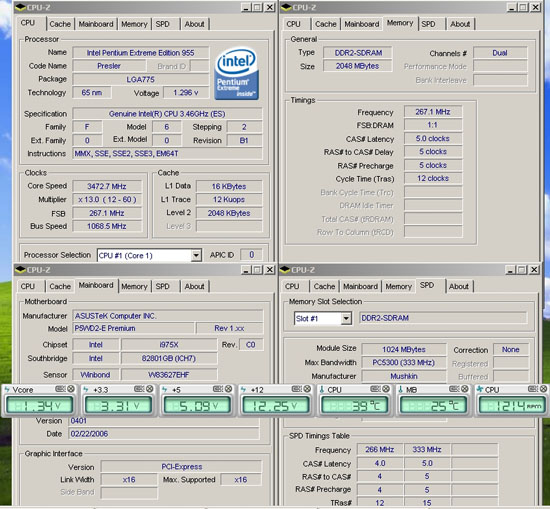
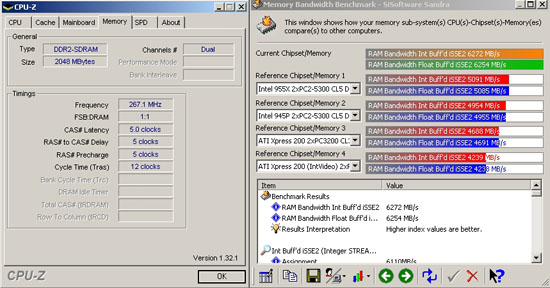
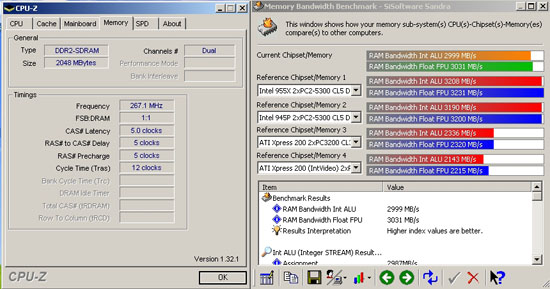
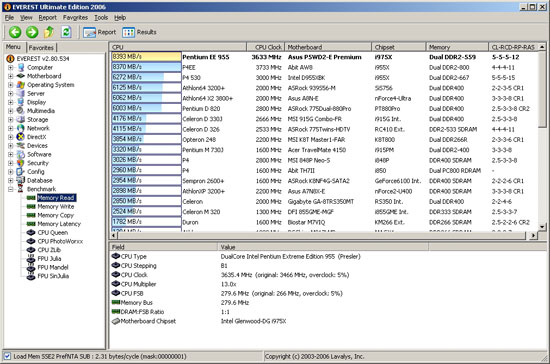
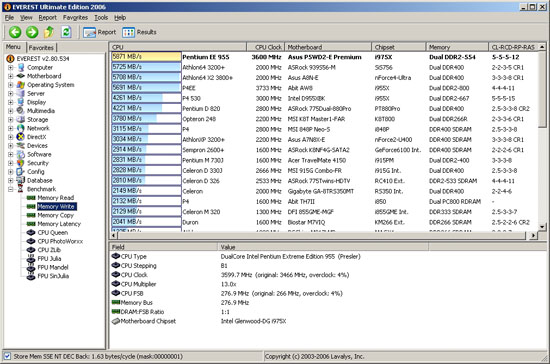
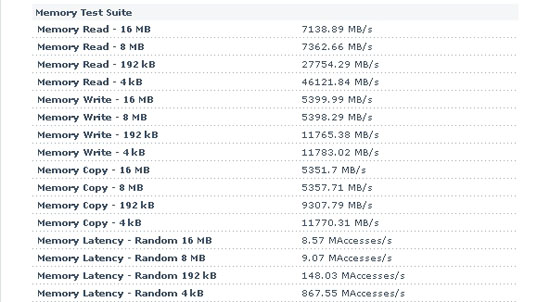








11 Comments
View All Comments
rallyhard - Friday, June 23, 2006 - link
NOTE:Under "Anandtech Deals" at the top of each page of the review, there is a link called " Mushkin 2 x 1 GB PC2-5300 DDR2 RAM". This link will take you to Mushkin part #991382 memory, which that page will tell you has 4-4-4 timings. Newegg will tell you this RAM has 5-5-5 timings. In any case, the RAM this link refers to is not the same stuff that they reviewed. The reviewed RAM is 3-3-3 timings, which I'm assuming must be Mushkin part #991512.
artifex - Tuesday, March 28, 2006 - link
Wow, last time I had a warranty return at Mushkin, I just emailed them their serials and they shipped me replacements overnight with my credit card as collateral for the return. Of course, I bought from their website, not from a retail store... but there was no talk of packaging. What packaging? :)Has Mushkin changed owners?
bldckstark - Tuesday, March 28, 2006 - link
On page 7 you show the Mushkin memory at the top of the graph with 65.1 and all other memories have lower times. To be consistent with all of your other graphs the rankings are apparently reversed since the super pi results are "lower is better", and the Mushkin should have finished last, not first and be on the bottom of the graph, not the top. Unless I forgot to take my medicine today, again, and I am reading the article upside down, again.Nice article. I'll keep waiting for the latencies to come down so that we might see some life out of AM2 against Conroe.
Wesley Fink - Tuesday, March 28, 2006 - link
The Super Pi chart is now in Ascending order as it should be. Thanks for bringing this to our attention.Pirks - Tuesday, March 28, 2006 - link
I recall buying some Mushkin stuff a long time ago. A HUGE price AFAIR and then one DDR stick died and they replaced it no questions asked. But now, after checking out their prices and seeing noname 2 GB DDR sticks for $200 CAN TOTAL (!) in my local store... well, guess which way I went. Now 2GB with the same price as Mushkin's EXTRADUPERFAST 512MB is soo sweet, no swap in XP and stuff... not saying Mushkin is bad, it's just so nice to spend $$$ on the AMOUNT of memory, not the speed. Sometime I'll get 4GB of noname sticks and make myself a hefty RAM disk and outrun those Raptor boasting kids, hehe :))artifex - Tuesday, March 28, 2006 - link
Pirks, spend a little more for name brand, even if not high-performance. That $20 or so you save up front isn't going to look so good if you ever have a memory glitch that causes you to lose data.I buy Mushkin, but only for machines that I'm going to be building at the margins of their rated specs, intend to overclock, etc. I feel like Mushkin sticks might be just a little more solid for that.
I don't overclock all my stuff, though, and for just regular performance that is solid, like in my Mac Mini, I use Crucial. I wouldn't go with a no-name. And I never, ever, would buy loose sticks from a place like Fry's. :)
Pirks - Wednesday, March 29, 2006 - link
That's because you don't know what www.memtest.org is :P
Inkjammer - Tuesday, March 28, 2006 - link
I've not seen enough of a performance boost from the "elite" memory to justify the price. Now, I say this, and I have 2GB of Kingston HyperX memory in my system. I swapped it out for 2GB of regular Kingston Value RAM and the performance difference was minor at best. If I weren't running a benchmark on it via SANDRA I'd never have even noticed.It seems to be geared to overclockers primarily, or people who just wanna pimp their rig. I think you could take the extra $200 for 2GB and invest in a beefier CPU or graphics card and really, REALLY see a performance difference.
WxChaser - Tuesday, March 28, 2006 - link
Mushkin was the first memory company to produce enthusiast memory using the Elpida chips, allowing them to overclock very well at tight timings for DDR2. These modules will provide excellent performance for Intel DDR2 motherboards, and migrate quite well to the AMD socket AM2 when those platforms are released later this year.Please note that Mushkin has revamped their main web presence recently, and markets to 3 main target groups now. These are enhanced performance, high performance, and extreme performance. The XP2 PC2-5300 modules we tested were the extreme performance category - in other words aimed at the overclocking and gaming niche markets primarily.
Inkjammer - Tuesday, March 28, 2006 - link
I'd still love to see a comparison on RAM between standard and enthusiast and stock speeds. I know that the built in spreaders are fantastic for heat dissapation, but how much added performance is gained for the extra money?Granted, I have enthusiast RAM, so... don't think of me as a hypocrit, but I still ponder just how much better this RAM is if you're not overclocking to the MAX.